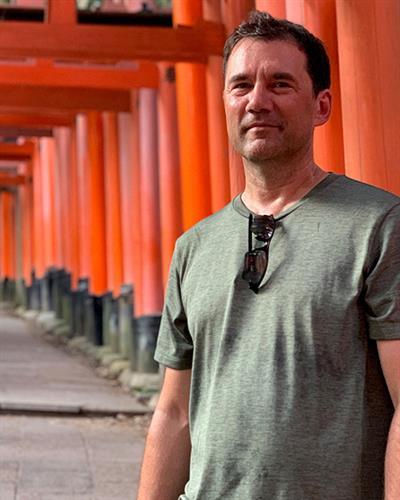
J. Matthew Harrington

Research/Areas of Interest
Ancient Art and Archaeology, Digital Humanities, Comparative Greek and Latin Grammar (PIE Linguistics), Roman Satire, Post-Augustan Literature, Latin and Greek Pedagogy
Education
- PhD, Classical Studies, University of Michigan–Ann Arbor, Ann Arbor, United States, 2009
- MA, Classical Archaeology, University of Michigan–Ann Arbor, Ann Arbor, United States, 2008
- MA, Comparative Literature, University of Arkansas at Fayetteville, Fayetteville, United States, 2001
- BA, Classical Studies, Summa Cum Laude, University of Arkansas at Fayetteville, Fayetteville, United States, 1998
- BA, Psychology, Summa Cum Laude, University of Arkansas at Fayetteville, Fayetteville, United States, 1998
- Certificate, Ancient History, University of Michigan–Ann Arbor, Ann Arbor, United States
Biography
Matthew Harrington's current research in language and pedagogy is centered in the editing and publication of digital commentaries on Latin and Greek texts fully diagrammed and analyzed sentence by sentence, where every word, clause, and phrase is morphologically identified, syntactically labeled, and connected to the word or structure that it modifies: a treebank. While he is independently completing the treebanked commentaries on the Satires of Juvenal and other texts, collaborative analysis and publication with students forms the bulk of this effort. Latin and Greek students from the third semester to advanced MA-level courses analyze sections of the assigned texts, collaboratively contributing to making additional commentaries globally available, while refining their control of Latin and Greek morphosyntax/semantics/style at a granular level. After the submission of final drafts by the students, M. Harrington collates and edits each of the texts, resulting in the current treebanked commentaries published within this project.
This form of analysis is a resource for making even the most complex Latin or Greek transparent, allowing students of the language at all levels to work toward a full appreciation of the semantic nuance of the texts. Concurrently, as machine-actionable XML data sets, these treebanks will form the basis of quantitative analysis of Latin and Greek stylistics and usage as further texts are added to the fully-analyzed corpus.
The operation of language in its social context is central to his approach to any author or text, and thus his extensive archaeological background in both Italy and Greece is vital to his understanding of the lived experiences that underlie the fluid semantic fields of ancient literary vocabularies. Among his primary interests is the interplay of social discourses across the domains of linguistic practice and material culture. In 2006-2007, he was a Regular Member of the American School of Classical Studies at Athens. He has worked with field excavations at the Athenian Agora, Corinth, Pompeii, Gabii, Roma, Samothrace, and Provence. In addition to field excavation, he has done extensive work with the documentation and 3d reconstruction of Pisidian Antioch and of the Sanctuary of the Great Gods on Samothrace. Among his primary interests in the field of Ancient Archaeology are the intersection of cultural practice with constructed space and the deployment of ideology through iconography and architecture.
This form of analysis is a resource for making even the most complex Latin or Greek transparent, allowing students of the language at all levels to work toward a full appreciation of the semantic nuance of the texts. Concurrently, as machine-actionable XML data sets, these treebanks will form the basis of quantitative analysis of Latin and Greek stylistics and usage as further texts are added to the fully-analyzed corpus.
The operation of language in its social context is central to his approach to any author or text, and thus his extensive archaeological background in both Italy and Greece is vital to his understanding of the lived experiences that underlie the fluid semantic fields of ancient literary vocabularies. Among his primary interests is the interplay of social discourses across the domains of linguistic practice and material culture. In 2006-2007, he was a Regular Member of the American School of Classical Studies at Athens. He has worked with field excavations at the Athenian Agora, Corinth, Pompeii, Gabii, Roma, Samothrace, and Provence. In addition to field excavation, he has done extensive work with the documentation and 3d reconstruction of Pisidian Antioch and of the Sanctuary of the Great Gods on Samothrace. Among his primary interests in the field of Ancient Archaeology are the intersection of cultural practice with constructed space and the deployment of ideology through iconography and architecture.